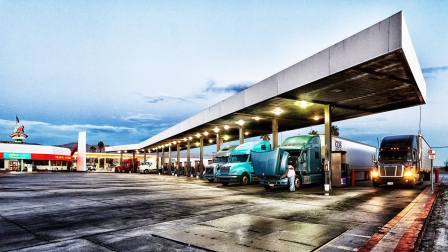CargoX Is A Platform For Self-Driving Trucks
Self-driving trucks are increasingly becoming a reality. (July 28, 2016), Daimler announced that one of its autonomous buses completed a 12.4 mile route involving turns, tunnels, and a series of stops. Its CityPilot is based on the same driverless trucks that drove 1,200 miles across four countries earlier this year.
While car companies are hard at work architecting the artificial intelligence required to make self-driving trucks a reality, another company is busy building a network that will connect these vehicles. Freight broker CargoX’s mobile platform can connect more than 150,000 independent truck drivers in Brazil with loads of freight. Trucks drive around empty 40% of the time in Brazil, the company asserts. At scale, CargoX aims to ensure drivers never have to be driving an empty truck—they’ll always be able to connect with a job.
CargoX allows Brazilian drivers to plot out their various pickups and deliveries ahead of time, rather than having to hunt for jobs at truck stops, as they currently do—and the company eventually wants to be able to connect autonomous vehicles with shippers.
CargoX is currently capable of recording tons of data on roadways and routes via drivers. “We’re mapping the system as a whole,” says Oscar Salazar, an Uber cofounder and CargoX investor. He says the platform will catalog what the most efficient routes are during specific times of day, as well as which paths are least susceptible to robbery—a very real problem that drivers on the road face in Brazil. Such information could make shipping freight faster and easier, allowing CargoX to save money and undercut existing trucking companies’ prices. And eventually, this data could help CargoX switch over from human-driven trucks to autonomous semis.
“Autonomous trucks are going to play an important [role] in this industry,” says Federico Vega, CEO of CargoX. “We will get into that in the future,”
The company just landed $10 million to expand operations internationally, where CargoX will be able to accrue even more trucking data. It’s an exciting prospect for investors. On their own, self-driving trucks aren’t much use. They will need a powerful set of data to inform their various pickups, drop-offs, and other travel plans—and that’s what CargoX stands to offer. The idea is so enticing, in fact, that Goldman Sachs’ private capital investing group is putting money on it. This is Goldman’s first investment in a South American company—and Goldman has a pretty good track record when it comes to placing these kinds of bets. In 2015, CB Insights ranked Goldman as one of top investors in unicorn companies for picks like Uber, Square, and Pinterest.
In any case, efforts are already underway to bring autonomous vehicle technology to bear. In Brazil, many cars have tracking features to prevent theft—and the government is in the process of getting 100% of cars outfitted with this technology. At the research level, the University of Sao Paulo has been experimenting with autonomous vehicles. Meanwhile, the Europe Union has been exploring the potential of autonomous vehicles for years. In January, the European Parliament issued a briefing on automated vehicles to examine the potential challenges of implementing the technology on roadways and discuss ongoing plans. Then, in April, the EU signed the Amsterdam Declaration, promising to put forth a set of collaborative rules that will help put autonomous vehicles on roads.
The U.S. is also hoping to usher in self-driving trucks, albeit a bit more slowly. In January, President Obama proposed the National Highway Traffic Safety Administration put $4 billion toward studying and integrating self-driving vehicles onto U.S. roadways.
For now, CargoX is focusing on emerging markets, where trucking comprises the bulk of freight transportation, the company says. But, given its plot to become the world’s top freight broker, it could ultimately play an important role in shaping how some of the first autonomous vehicles hit roadways.
Fast Company , Read Full Story
(24)













